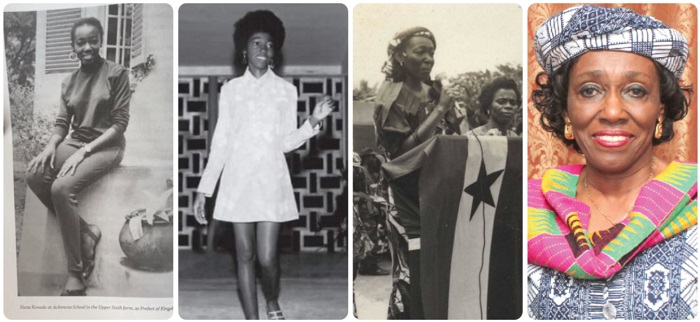Nana Konadu Agyeman-Rawlings, the founder and leader of the National Democratic Party (NDP), was one of Ghana’s most influential political figures and a trailblazer for women’s empowerment in Africa.
She passed away on Thursday, October 23, 2025, at the Ridge Hospital in Accra, aged 76. Her passing marks the end of an era for Ghanaian politics and women’s advocacy, but her legacy continues to shape the nation’s democratic and social development.
Related Articles
Former First Lady Nana Konadu Agyeman-Rawlings dies
Nana Konadu Agyeman-Rawlings lays wreath in honour of helicopter crash victims
Nana Konadu Agyeman-Rawlings calls for urgent action on gender equality
Born on November 17, 1948, in Cape Coast, Nana Konadu Agyeman-Rawlings (née Agyeman) was the daughter of J. O. T. Agyeman and his wife. She began her education at Ghana International School before transferring to Achimota School, where she met her future husband, Flight Lieutenant Jerry John Rawlings, Ghana’s first president under the Fourth Republic. She later attended the Kwame Nkrumah University of Science and Technology (then the University of Science and Technology), where she studied Art and Textiles and became a student leader of Africa Hall.
In 1975, she earned a diploma in Interior Design from the London College of Arts. She went on to acquire additional qualifications, including a diploma in Advanced Personnel Management from the Management Development and Productivity Institute in 1979, and a certificate in Development Studies from the Ghana Institute of Management and Public Administration (GIMPA) in 1991. She also studied at Johns Hopkins University and the Institute for Policy Studies in Baltimore, where she completed a Fellows Programme in Philanthropy and Non-Profit Organisations.
Nana Konadu’s prominence on the national stage began when she became Ghana’s First Lady during her husband’s first tenure as Head of State in 1979, and again from 1981 to 2001, spanning both military and democratic administrations. She was widely regarded as one of the most active and influential First Ladies in Africa, using her position to drive social change, particularly in the areas of women’s rights and community development.
In 1982, she founded the 31st December Women’s Movement (DWM), a non-governmental organisation aimed at empowering Ghanaian women socially, economically, and politically. She once described the movement as “a broad-based, development-oriented organisation that aspires to achieve these objectives through the effective mobilisation of women.” Under her leadership, the DWM mobilised over two million women and established more than 870 pre-schools across Ghana, promoting child development, literacy, and family planning. The movement became a model for grassroots activism in Africa and helped secure greater recognition for women in national development.
Her advocacy also led to major legal reforms, including the passage of the Intestate Succession Law (PNDCL 111), which protected the inheritance rights of widows and children. Through her efforts, Ghana became the first country to ratify the United Nations Convention on the Rights of the Child in 1991. These achievements positioned her as a global voice for women and children’s rights.
In politics, Nana Konadu Agyeman-Rawlings made history in 2016 as the first woman to contest Ghana’s presidency on the ticket of the NDP, a party she founded after leaving the National Democratic Congress (NDC), which was established by her husband. Earlier, she had served as the First Vice Chairperson of the NDC and had contested the party’s presidential primaries in 2011 against the late President John Evans Atta Mills. Though she lost the bid, her courage to challenge the party establishment underscored her independence and political conviction.
Her contributions to governance and gender advocacy earned her recognition at home and abroad. She was honoured by Johns Hopkins University’s Institute of Policy Studies as a Senior Fellow in 1994 and was later conferred with an Honorary Emeritus Fellowship by the Boardroom Institute of the Graduate School of Governance and Leadership.
Beyond politics, she was an author and a mentor to many young women. In 2018, she launched her book, It Takes a Woman, which chronicled her experiences as First Lady and her lifelong commitment to women’s empowerment. In her own words, “The struggle for women’s equality is not a favour to women; it is a necessity for national progress.”
Nana Konadu Agyeman-Rawlings is survived by her four children and a legacy that transcends politics. Her life was one of conviction, service, and the pursuit of equality. From the corridors of power to the grassroots of Ghana’s communities, she stood as a symbol of resilience and the transformative power of leadership driven by purpose.
Her story remains a powerful reminder that leadership is not defined by position but by the courage to create change. As she once stated, “If political freedom was the defining struggle of our past, then economic and social empowerment must be the defining mission of our future.”

